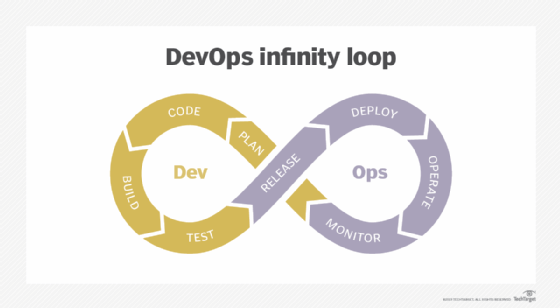Developer vs. DevOps roles: What's the difference?
The terms DevOps and developer are used interchangeably far too often in the IT job market. These terms aren't synonyms, and when they are used in such a manner, it can create a great deal of confusion for prospective candidates on what the position entails.
Let's compare developer vs. DevOps roles and tasks in an organization and determine how they differ to help evaluate which one might be a better fit for you.
The software developer vs. DevOps engineer
One of the key differences in the developer vs. DevOps comparison is how specific the role is inside an organization.
A developer's primary task is self-descriptive: Create software by writing code. A developer likely focuses on a single language and platform, such as Java and the application server, or Spring Boot and Docker containers.
In contrast to the singular focus of a developer, a DevOps engineer has a widespread net. A DevOps engineer deals not only with code-related tasks, but issues related to monitoring, testing, release management and operational planning.

DevOps and developer tasks comparison
As another means to compare a developer vs. DevOps engineer, let's explore the various tasks associated with each position's daily job functions. Common tasks of a software developer might include:
- Create a RESTful web service with Spring Boot;
- Compile, package and troubleshoot code using Java utilities;
- Programmatically connect to databases using Hibernate or JPA;
- Manually deploy EAR, WAR and JAR files; and
- Optimize CSS and JavaScript code for page performance.
A DevOps engineer, by comparison, focuses on tasks to bridge the gap between development and operations teams. For example, a DevOps engineer could automate the movement of a JAR file -- created by a developer -- onto a production server run by operations.
Other tasks that fall in line with a DevOps position include:
- Create reusable, parameterized Jenkins builds;
- Automate WAR file deployments to production servers;
- Integrate Git and GitHub servers;
- Configure build pipelines to use static analysis tools; and
- Monitor DevOps metrics such as lead time and delivery flow.
Why the developer vs. DevOps confusion?
When you compare the job duties of DevOps engineers and developers, they're quite different. So, that begs the question, why is there so much confusion between these two terms and the roles they play in an IT organization?
One element of the confusion stems from the uptick in popularity for DevOps and its relationship to the job market. DevOps is a trendy topic in the IT world, and in some cases when HR professionals create job postings, they unwittingly use the term because it sounds good, not because it's a good match for a potential candidate.
Another confusing aspect in this comparison comes from a desire within organizations to find developer candidates that possess skills that overlap with a DevOps professional. For example, knowledge of automation and continuous integration could pay off in a move to modernize IT. It only makes sense for an organization that wants to build a DevOps culture to look for new developers who are familiar with concepts common to the DevOps creed.
Software developer or DevOps engineer: Which is better?
DevOps and developer roles are quite different, though they are both critical to a modern digital enterprise.
If you like to work independently and are perhaps even a bit of an introvert, a software development role in which you can focus exclusively on a given problem might be a better fit. Developers are highly specialized in their code language and the platform they deploy to.
If you're more of an extrovert and enjoy teamwork or working on multiple problems across different platforms at the same time, a DevOps role might be more rewarding than development work. The ideal DevOps engineer is a generalist familiar with technologies that smooth the transition between software development, operational deployment and lifecycle management of a running application.


